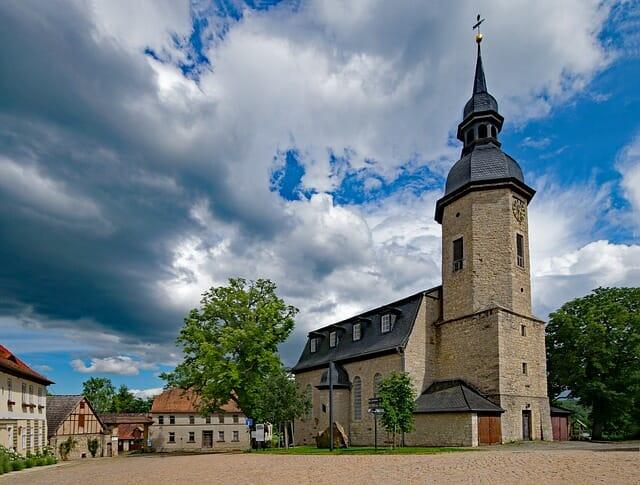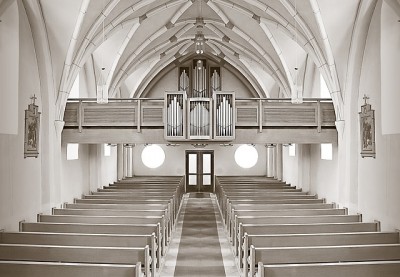
When you hear the word “church,” do you first think of a building or a people?
Famous revivalist Leonard Ravenhill said: “In the church in Acts, the Scripture says they were all amazed, but today, everyone just wants to be amused.”
As we look out over the landscape of the church as we know it today in modern-day America, this statement could not be truer. Many are drawn to the church because their flesh is fed in a religious fashion, but their souls remain dead to God and the love of Christ. To attract the world in an age of folly and sensuality, pastors have dressed the church in the garb of a clown or the gown of a vagabond.
But what is the church? Ephesians 2:19-22 states:
So then you are no longer strangers and aliens, but you are fellow citizens with the saints and members of the household of God, built on the foundation of the apostles and prophets, Christ Jesus himself being the cornerstone, in whom the whole structure, being joined together, grows into a holy temple in the Lord. In him you also are being built together into a dwelling place for God by the Spirit.
The analogy the Apostle Paul uses is that of a building project—the household of God. Every true Christian—that is, the person who has turned from his sin (repented) and believed that Jesus Christ is the risen Lord—is part of the church universal (sometimes called the invisible church).
The true church is made up of those who are regenerate, repenting, believing and being conformed to Christ. We are weak sheep of a mighty Shepherd! The true church is marked by devotion, obedience and perseverance (even under trial) to the Word of God rightly preached, the ordinances faithfully administered, and church discipline employed (when necessary), not because of its own goodness, but because of its Shepherd, Jesus Christ.
Christian Heroes For Christian Kids: These Amazing Stories Are Putting God Back Into History!
Because the whole theological scope is deeper and wider than this short column, here are 10 biblical and practical faith lessons to consider about the church:
1. The church is a divine project—God’s undertaking to eternally display His glorious grace
Christianity is a church experiencing the glory of Jesus, with the senses of the heart, through the Gospel, by God’s power (2 Cor. 3:18). That’s why a church that is weak in missions is weak in worship. If your focus is on God’s glory, your life will be about His mission.
2. We need to be constantly reminded that the church He leads is not our church; it’s Christ’s church (1 Tim. 3:15-16).
For the most part, evangelicals have not done a good job of articulating a theology of the church. At the cross, Jesus bought His chosen bride, the church, at the cost of His own life. Not a drop of His blood was shed in vain. So, God’s church isn’t a venue for us to perform at, but, rather, a garden for us to grow in. What His Word says is sufficient for all of our needs in the church.
3. The church is not a property, but a people. We can only go to church when God’s people are there.
Some people are members of the church. Others are members of the building where the church meets (3 John). The church of Jesus Christ is an organism, not an organization. That should radically shape our practice.
4. The problem in the church isn’t too much theology; it’s not enough of the right theology.
I’ve noticed that church division is rarely theological in nature. Instead it’s generally related to people being jerks and blaming theology. Yet, there’s no peace in the church without doctrinal purity in the church. True peace comes not through compromise but biblical truth (Jude 3).

5. When we try to perform the ministry of the church in the world’s way, we not only make God laugh but the world, as well.
We’re not called to ruminate about reinventing the church. We’re called to faithfully minister ordinary means of grace (2 Tim. 4:1-6). There is change in the church — but what kind, to what end, and through what means? For that, Scripture, not culture, must provide the answer.
6. The church should not be a community of self-righteous people, but a community of broken people who know they need grace.
The church isn’t an organization of spiritual giants. It’s broken men and women who can lead others to the cross. Maybe the biggest sin in the church is this: staunchly holding to biblical doctrine, while easily accepting broken relationships (Rom. 12; Eph. 5). We should be able to say, “We’re the perfect church for imperfect people, and we do it imperfectly.”
7. The church should strive to be at peace with all men but we ought to be concerned if we’re not upsetting anybody.
A church must stand for the truth or it will fall for anything. Leading in the church is not about casting or selling our vision. Rather, it’s about knowing, following and preaching God’s vision from His Word (2 Tim. 3:16).
8. Be among those in your congregation keeping the Gospel central, guarding the church’s unity, loving as Jesus loves you & welcoming outsiders.
Unity in the church is not something we can ever take for granted (Eph. 4:1-6). Ask the Lord to show us how to guard the peace and unity of your church today, by our attitudes, words and actions.
9. Satan’s first appearance in the book of Acts is not out in the world but in the church, spreading hypocrisy (Acts 5:3).
Imagine if we all acted right, did good deeds, recycled, helped each other, went to church … but didn’t treasure Jesus. Satan would love it!
If your church is not facing spiritual opposition, it could be that you need to rethink your ministry. Satan opposes that which glorifies God.
10. Make prayer your first instinct when you see weakness in the church (John 17).
After all my years, I am still amazed at how weak I am apart from prayer. Our weakness, like all other inconveniences, leads us to Christ. Let us be more upset by our own gossip about others than we are by others’ gossip about us—and pray for all involved.
What is the church? The purpose of the church is not to attract. It is to “go.” But a missional church is attractive. Are you on mission?










